On “Emotion Journey,” songwriter and digital music composer Bill Barlow rises not just as a storyteller, but as a sensitive cartographer of the human condition; mapping longing, regret, humor, and hope with lyrical precision that quietly pierces the soul. Released on May 16, this album marks a masterclass in emotional storytelling and thoughtful songwriting, the work of an artist who listens deeply to life and translates its nuances into song.
Barlow, whose background in advertising and marketing sharpened his message-crafting skills, brings an “observational” lens to his music, offering stories that unfold with an unforced intimacy. His strength lies in making listeners feel like participants; welcoming them into shared moments of heartbreak, reflection, and revelation deeply personal and strikingly universal lyrics.
Commencing with “Smooth as Glass,” Barlow opens a wound softly in this aching reflection on lingering love. The repeated refrain—“I want to escape from you, but she stays etched on my mind”—is as fragile and haunting as the title suggests. His restrained vocal performance simmers with quiet sorrow, underscored by atmospheric guitars and minimalist percussion. The track is a meditation in stillness, like staring into a lake that reflects both memory and regret.
The second track “Staying Put” is an anthem for the grounded soul. With lines like “You see a map but I see roots”, Barlow honors those who find beauty in the quiet rhythms of home life. His vocals feel lived-in and affectionate, the production clean and subtle, leaving room for the message to bloom. It’s a beautifully understated celebration of rootedness in a world obsessed with motion.
With “I’ll Never Be Free,” Barlow taps into the raw nerves of modern anxiety with blues-rock urgency. Time is the enemy, and he gives it a voice that haunts. With a gritty delivery and lyrics like “Even dying won’t wait”, the song races with a sense of existential dread, matched by tension-laced instrumentation. It’s one of the album’s most emotionally urgent offerings—tight, tense, and unforgettable.
A timely meditation on digital disconnection, “She’s Unreal” captures the eerie divide between virtual affection and emotional emptiness. With weary vocals and shadowy production, Barlow navigates fascination and disillusionment. “But I can’t feel her touch / There is no skin” is a lyrical punch that lands hard in the age of AI and screen-based relationships.
In “Rehashing (Soul Searching),” that is Barlow at his most exposed. A slow-burning ballad anchored by plaintive strumming and ambient textures, the track details emotional paralysis with lines like “we spoke truth and never knew we were lying.” His trembling voice mirrors the pain of self-confrontation, and the song becomes a quiet reckoning with past illusions and heartbreak.
With a weary tenderness in “Loving Success,” Barlow recalls a relationship that never found its footing. His delivery—gentle but weathered—lets the bittersweet story unfold in hushed tones, supported by subtle acoustic guitar and minimalist percussion. “We thought we had the answers / We never had loving success” distills the heartbreak into a line that resonates long after the final chord.
One of the most hopeful moments on the record, “There’s Light” is an anthem for the uncertain. Barlow wrestles with doubt and self-perception but ends on a quiet note of reassurance. “I don’t mind being strange / I’m just looking for something of my own” feels like a declaration of gentle defiance. The song glows with understated warmth and sincerity.
A spiritual ballad in the most grounded sense, “Heaven Knows” is a hymn for the wandering soul. Barlow’s earthy vocals and minimal instrumentation create a sanctuary for introspection. The chorus—“Heaven knows where you come from, Heaven knows where you’ll go”—becomes a gentle mantra for accepting the unknown with grace.
“Every Time I Call” explores the exasperation of emotional one-sidedness with charm and desperation. “Voicemail drives me crazy” becomes a painful hook in a song built on conversational realism. With melancholy pop-rock flair and earnest vocals, Barlow creates a sonic voicemail we’ve all left, complete with pleading vulnerability and just a hint of indignation.
“Days of Rain” becomes a metaphor for necessary melancholy in this tranquil meditation. Barlow’s warm, melancholic delivery and stripped-down arrangement let lines like “There’s a need for a rainy day” settle in like the comfort of gray skies. It’s a reminder of the quiet healing power in letting sadness speak.
“Burning My Bridges,” the eleventh track is a reckoning with emotional detachment, a quiet acceptance of the need to move on without fully forgetting. With lyrics like “I used to burn my bridges… but I kept them even so”, Barlow encapsulates the album’s themes in one poignant refrain. His voice, rich with experience, offers closure—not through certainty, but through grace.
Moving on to “Abuse The Muse,” it’s a haunting meditation on creativity itself. Here, Barlow questions the very nature of inspiration with lines like, “Would I abuse the muse if I use what I choose” and “Should I sign my name to the work or should I write down alcohol.” His vocals feel like a conversation, intimate and contemplative, as if he’s journaling aloud in a quiet room.
Then there’s “Talking In Her Sleep,” which dives into the fragile, uneasy territory of betrayal and unspoken truths. The song floats on a hypnotic, melancholy melody that blends soft acoustic guitar with brushed snares and ambient undertones, crafting a beautiful soundscape. Barlow’s voice trembles with tension and tenderness, delivering the chilling lines, “She doesn’t know that he knows. What she does whenever she goes.” There’s an aching restraint in his performance that makes the slow build of emotional unraveling all the more devastating. This is music that makes you lean in, listen closely, and feel the quiet weight of heartbreak without a single shout.
Closing this emotional album, “I Never Asked You To Love Me” is an unapologetic breakup anthem that cuts through sentimentality with razor-sharp honesty. The lyrics — “I tried, you lied, it died. Which one of us is to blame” expose the raw fractures of a relationship that burned out fast. Barlow’s vocals carry a warm, weathered tone, walking the line between reflective pain and confident closure. This is a refreshingly honest farewell, delivered with a sense of emotional integrity that few can pull off.
What ties all these songs together isn’t just lyrical depth—it’s delivery. Barlow doesn’t perform songs so much as inhabit them. His vocals aren’t polished to perfection and that’s exactly the point. They’re real. They feel like they’ve lived through the stories they tell. Whether whispering a confession or muttering a clever jab, his voice carries the weight of experience. It’s the kind of performance that feels less like a recording and more like a memory being shared for the first time.
Production-wise, Emotion Journey leans into a timeless palette—acoustic guitars, clean piano lines, gentle percussion—always in service to the story. There’s a clarity to the mixing that honors the emotional honesty of the songwriting. Nothing is overproduced. Every sonic choice feels intentional.
In all, this is an album that never rushes in a world built on speed. “Emotional Journey” is an invitation to slow down and feel. It reminds us that music doesn’t have to scream to be heard. Sometimes, it just needs to whisper something true. In Bill Barlow, we have found not just a musician, but a modern-day troubadour; a soul unafraid to admit when things hurt, confused, or amuse. “Emotion Journey” isn’t just an album title. It’s a roadmap through the nuance of living. And I, for one, am grateful to have taken the ride.
Listen to the “Emotional Journey” album on Spotify
Follow Ian Rae here for more information






